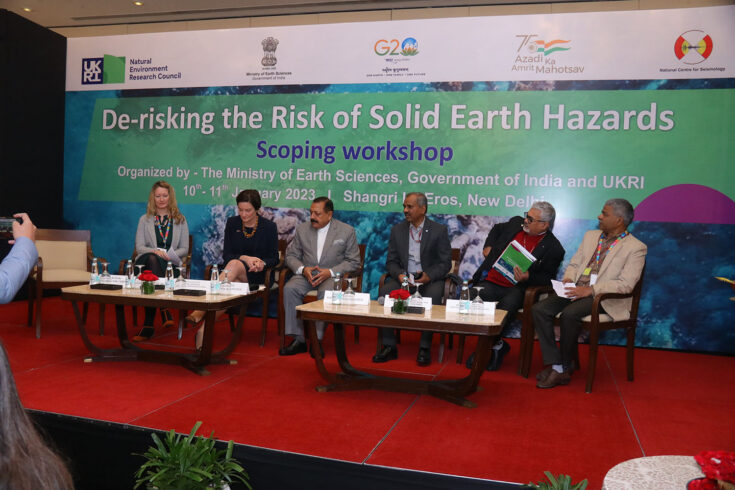Geohazards, such as earthquakes and landslides, disproportionately impact low and middle-income countries, inflicting loss of life, crippling infrastructure, and displacing communities.
So impactful are the consequences of geohazards that working alone to tackle them won’t make the change needed. Building resilience to geohazards requires collaborative international action by researchers, policymakers, governments, private sectors and civil societies.
That’s why we created our joint programme, understanding geohazard processes and their impacts across India.
Working with India
Our programme fosters an alliance between the Natural Environment Research Council (NERC), on behalf of UK Research and Innovation (UKRI), and India’s Ministry of Earth Sciences (MoES).
The programme’s funding structure highlights the value international links can have. For example, UKRI committed up to £4 million to this programme, with equivalent matched funding provided by MoES for Indian applicants.
This means that five interdisciplinary projects, each led by a collaborative principal lead from the UK and India, can explore cutting-edge geohazard solutions, such as early warning systems, all tailored to the region’s specific needs.
It is important to build resilience for vulnerable communities that often bear the brunt, particularly in regions like India and its surrounding countries. And collaboration helps to grow capacity and create networks.
Navigating opportunities, embracing agility
International collaborations inherently offer growth opportunities, and our partnership with UKRI India played a crucial role in embracing them.
Sukanya Kumar, Ryan Warren and Basheera Shaik, pivotal figures at UKRI India, were instrumental in establishing our relationship with MoES. Their support in navigating the scoping process, understanding funding limitations and leveraging cultural differences proved invaluable.
New perspectives emerged from this cross-border exchange, prompting innovative approaches.
Building the collaboration
But this collaboration wasn’t born overnight. The seeds were sown before the COVID-19 pandemic when NERC representatives embarked on a journey to India with UKRI counterparts.
They engaged in open dialogues, building bridges with government departments and institutions. Though the pandemic temporarily stalled momentum, with my arrival at NERC in 2021, I saw a resurgence of enthusiasm from both the UK and India to collaborate on a programme of work that could make a real difference.
A pivotal visit to India
January 2023 marked a pivotal moment. My colleague Michelle Manning and I embarked on a crucial visit to India, meeting with MoES and UKRI India colleagues. Our mission was to create a joint workshop to delve into the potential of a transformative geohazard research programme.
This workshop, attended by a carefully curated delegation of academics from both nations, became a catalyst, shaping the programme’s themes and paving the way for its groundbreaking nature.
The workshop’s inauguration by Dr Jitendra Singh, the Science Minister for India, and the Deputy British High Commissioner underscored the initiative’s significance. National media attention in India further solidified the importance of this cross-border collaboration. Notably, the programme embraced a novel approach for MoES, integrating social sciences, arts and humanities alongside their traditional environmental and physical science stance.
Strengthening bonds
Our visit to India in January 2023 proved transformative, fostering trust and understanding between the teams. The joint workshop allowed us to meet our counterparts face-to-face, facilitating a deeper comprehension of each other’s processes.
This personal interaction laid the foundation for a successful programme and significantly strengthened our relationship with our Indian colleagues.
Expert advocacy
This was and remains a team effort. Dr Sarah Turner, Associate Director of Strategic Programmes Generation and Delivery at NERC, played a crucial role in aligning our geohazard programme with the UKRI building a secure and resilient world theme, particularly the sub-theme focusing on the natural and built environment.
Dr Turner’s advocacy for the international dimension further strengthened the programme’s strategic significance.
Awards showcase
The programme and all the work leading up to launching the funding opportunity has resulted in five awards, which will deliver against the programme objectives.
The top five awards display impressive diversity, both geographically and institutionally as well as covering a range of different geohazards. India’s National Centre for Seismology, a central MoES institute, and strategic partnerships with the Borehole Geophysics Research Laboratory exemplify the programme’s reach within India.
Meanwhile, the involvement of UKRI’s research councils ensures a comprehensive and inclusive approach to geohazard research spanning:
- NERC
- the Economic and Social Research Council
- the Arts and Humanities Research Council
- the Engineering and Physical Sciences Research Council (EPSRC)
Notably, leadership from EPSRC’s communities in one proposal highlighted our programme’s successful communication of its scientific openness, showing true UKRI endeavour.
The transformative journey ahead
This collaboration is more than a research initiative. It is a testament to the power of international collaboration, resilience and shared aspirations for a secure and resilient future.
Find out more about the funding winners at: UKRI and Government of India address global challenges.



